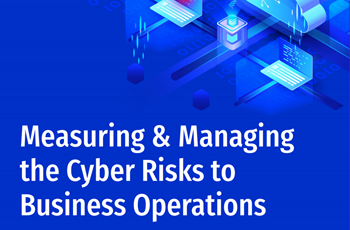In today’s evolving threat landscape, the importance of obtaining cyber insurance cannot be overstated.
Cybercriminals are constantly developing new ways to scale up their attacks, meaning even the most robust cybersecurity measures aren’t always enough to protect businesses from a breach.
With the global annual cost of cybercrime predicted to reach $9.5 trillion this year alone, it’s no wonder that many organizations are turning to cyber insurance as a means of financial protection.
What is Cyber Insurance?
Cyber insurance, also known as cyber liability insurance or cybersecurity insurance, is a specialized insurance product designed to protect businesses against financial losses resulting from a cyberattack or data breach.
Any business that stores sensitive client, customer, or partner data, or supports electronic transactions, could benefit from cyber insurance coverage.
Specifically, industries such as healthcare, financial institutions, government agencies, and educational institutions are prime targets for cybercriminals due to the sensitive nature of the data they handle. These organizations should consider cyber insurance as a crucial component of their risk management strategies.
The Different Types of Cyber Insurance
Cyber insurance policies provide coverage for a range of expenses, from incident response costs to potential liability claims arising from the breach. As such, policies can be categorized into two main types: first-party coverage and third-party liability coverage.
First-Party Cyber Insurance: Safeguarding Your Assets
A first-party cyber insurance policy focuses on the direct losses a company may incur due to a cyber event or attack.
This form of coverage typically includes reimbursement for the financial fallout of a cyber incident, such as funds stolen or business interruption expenses. Additionally, it may cover the costs associated with investigating the breach, restoring data, and implementing security measures to prevent future incidents.
First-party cyber insurance is crucial for businesses looking to safeguard their interests, providing a safety net that helps mitigate the immediate and direct consequences of a cyber incident.
Third-Party Cyber Insurance: Managing External Liabilities
Conversely, third-party liability coverage protects businesses from liability when a customer, partner, vendor, or other party takes legal action following a breach.
This type of policy may cover legal fees, settlements, and regulatory fines resulting from a data breach. Additionally, it may extend to cover costs related to notifying affected parties, credit monitoring services for affected individuals, and public relations efforts to manage reputational damage.
As the regulatory landscape around data protection continues to evolve, third-party cyber insurance has become a crucial component of risk management for businesses looking to navigate the complex aftermath of a cyber incident.
The Challenge with Obtaining Cyber Insurance
While cyber insurance can provide valuable protection, obtaining coverage has become increasingly challenging as the frequency and severity of cyberattacks continue to rise.
In the first half of 2023, the overall number of insurance claims rose by 12%, with ransomware attacks as the largest driver of this increase, accounting for 19% of all reported claims. As more businesses turn to cyber insurance as a means of transferring the financial fallout to their insurer, policy providers are put under increasing pressure.
Navigating the Search for Affordable Coverage
In response to escalating risk and higher claim payouts, insurers have been compelled to make adjustments to their policies to maintain their profitability. These changes include raising premiums and making underwriting processes more rigorous.
According to this report from Databarracks, more than 70% of organizations reported changes to their cyber insurance between 2022 and 2023. While just under a third saw an increase in costs, over 40% reported increased requirements from their insurers for cybersecurity tools such as Endpoint Detection and Response (EDR).
For many businesses, these changes put further pressure on already tightening cybersecurity budgets, while also increasing the time and effort spent on obtaining insurance. The 2023 State of Cyber Insurance Report from Delinea found that the number of organizations requiring six months or more to secure coverage has soared 21x year on year.
The Risk of Being Denied Coverage
Another challenge lies in the chances of being denied coverage.
Businesses with a track record of cyber breaches are often categorized as high risk by underwriters, complicating their ability to obtain coverage for subsequent incidents. Insurance providers typically assess an organization’s security risk profile and the expenses linked to past incidents before extending coverage. These expenses contribute to the organization’s overall risk profile, potentially leading to their insurance premiums being increased or their application for coverage being denied.
Deciphering Complex Insurance Terms
The legal and technical jargon used in insurance policies can also pose a challenge for companies without prior experience in cyber insurance.
As the cyber threat landscape evolves, so too does the language and terminology used in cyber insurance policies. New coverage limitations can also create new uncertainties for policyholders. This lack of understanding can lead businesses to choose plans that do not adequately meet their specific cybersecurity needs. This, in turn, means paying the premiums on a policy that won’t pay out when an incident occurs and a claim is made.
How an MSSP Can Help With Cyber Insurance
To obtain effective cyber insurance coverage at a reasonable premium, organizations should focus on implementing strong cybersecurity measures and demonstrating their commitment to cyber resilience. Insurers are more likely to offer favorable terms to businesses that can prove they have robust security controls in place.
This is where partnering with a Managed Security Service Provider (MSSP) can prove crucial. MSSPs can help organizations improve their cybersecurity posture, demonstrate their commitment to security, and enhance their chances of obtaining favorable cyber insurance coverage.
Understanding Managed Security Services Providers
A managed security service provider is a third-party vendor that allows organizations to outsource part (or all) of the monitoring and management of their cybersecurity functions. Unlike a managed service provider (MSP), MSSPs focus specifically on cybersecurity.
When it comes to obtaining cyber insurance coverage, the right MSSP can help businesses along each step in the journey:
-
Risk Assessment & Mitigation: Before they consider providing coverage, insurers will look to assess an organization’s level of risk. By leveraging the support and expertise of an MSSP, businesses can identify their potential vulnerabilities and implement appropriate security controls. This can help to reduce their risk and improve their overall security posture, which in turn can make their insurance premiums more affordable and potentially aid in policy procurement and renewal.
-
Coverage Selection & Application: Insurers typically request detailed information regarding an organization's cybersecurity measures. MSSPs can provide the necessary documentation to support this part of the application process and answer an underwriter’s potential questions. MSSPs can also provide businesses with valuable guidance when it comes to choosing the right insurance coverage for their needs and ensuring they understand the terms of their policy.
-
Policy Compliance & Claims: Beyond securing cyber insurance, MSSPs can also play a crucial role in ensuring a business’ continued compliance with their policy requirements. By actively monitoring and managing cybersecurity functions, MSSPs assist businesses in maintaining a consistent and robust security posture. This proactive approach aligns with insurers' expectations, reducing the risk of a potential claim being denied as a result of a “failure to maintain” an adequate security posture.
The Growing Importance of an MSSP
In a world increasingly reliant on technology, cyber insurance has become a necessity for businesses seeking to protect themselves from the financial and reputational damage caused by cyber incidents. Obtaining such insurance, however, can be a complex process requiring specific security measures and compliance with certain regulations. This can make the cybersecurity and insurance landscape a tricky one to navigate.
For many businesses, partnering with a Managed Security Service Provider (MSSP) emerges as the clear path forward.
MSSPs offer a range of cybersecurity services to help businesses protect their digital assets. These services can include network and endpoint security, vulnerability management, threat intelligence, and incident response. With support from an MSSP, businesses can feel confident they have the expertise and resources required to implement and maintain effective cybersecurity measures. This, in turn, can help organizations meet the requirements of insurance providers, reduce their premiums, and increase their likelihood of a successful claim should the worst happen.
Remember, cyber insurance is just one piece of the puzzle. The relationship between a business and an MSSP is also a strategic one.
As technology and cyber threats continue to advance, the role of MSSPs in guiding businesses toward cyber resilience will become indispensable. By working with an MSSP, organizations can feel secure in the knowledge that their cybersecurity measures align with industry standards and regulatory demands, and that they are well-prepared to survive a potential attack.
Access the latest business knowledge in IT
Get Access





Comments
Join the conversation...